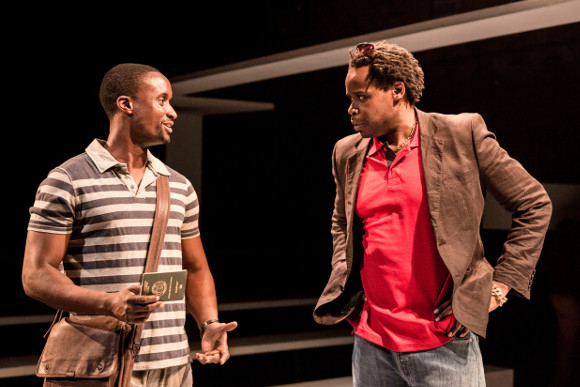Routes
Rachel De-Lahay’s play, exploring the UK immigration system, could be further developed but the story carries an affecting sweetness, says Amardeep Sohi

© Johan Persson
“To live.” These two words sum up the simple motivations of a father, who, having been deported from the UK, attempts to re-enter under an alias. His journey is one of two that Rachel De-lahay traces in this topical play, in which the shades of grey that cloud the immigration system are placed centre stage, albeit fleetingly.
Paul Willis‘ sharp lines hang above a square stage at the centre of the Jerwood Theatre Upstairs; positioned to allow six characters to cross fictional, national and emotional lines. We first meet Olufemi (Femi), as he is being prepped in Nigeria for potential questioning at border control by the brash Abiola, who, adorned with the golden spoils of his job, offers Femi a heavy dose of reality, which ironically appears to skim past the walls of his own conscious.
A swift switch and we meet teenagers, Kola and Bashir, who share a room in a London hostel. Bashir, (or Bash, as he comes to be known) was granted indefinite leave to remain as a child, but at eighteen, his status shifted, resulting in him being detained in Colnbrook – the immigration removal centre in London’s zone 6. He is supported by his probation officer, Anka, who herself has become naturalised.
The hostility which marks the beginning of their relationship melts into a warm, sibling-like camaraderie, as Bash becomes entrapped within the cracks of the immigration system and the young men bond over teenage trifles and the more fragile concerns of stability and security. Fiston Barek and Calvin Demba‘s pairing as Bash and Kola, creates an affecting sweetness that travels through the piece.
Directed by Simon Godwin, simplicity and truth are the pivotal elements on which De-lahay’s play turns. Via Femi and Bash, she neatly unveils the stories of those entrapped within the lines drawn by the immigration system, drawing a tale of humanity and the desire to belong.
That said, the seventy minute play could benefit from further development, particularly with regard to the other characters. There are hanging questions concerning Anka’s own journey and her motivations for assisting Bash (enhanced by Anamaria Marinca‘s perfectly pitched performance). Kola’s troubled relationship with his mother Lisa, also feels shallow and underdeveloped.
In Routes, Rachel De-lahay tackles an immense subject, but she does it with heart.
– Amardeep Sohi
@AmardeepSohi1












